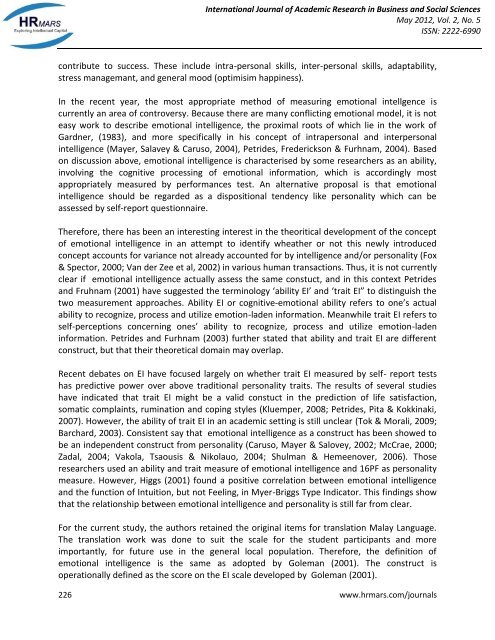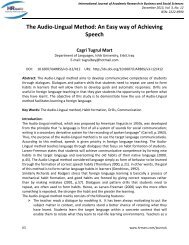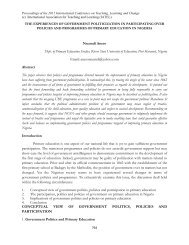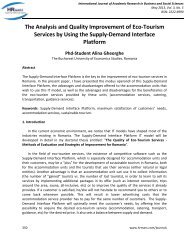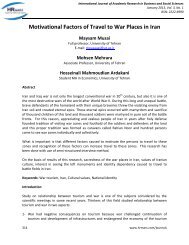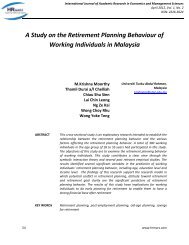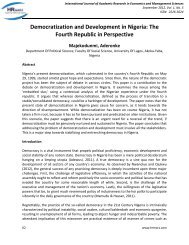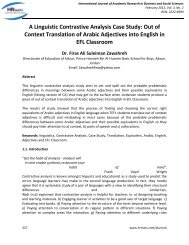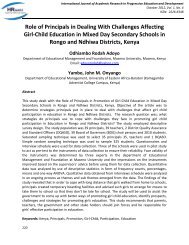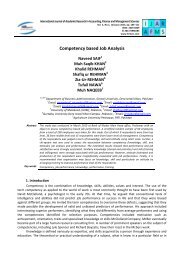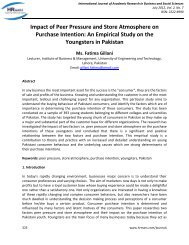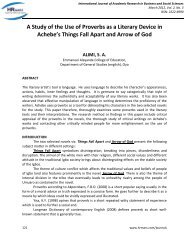Inter Relationship between Emotional Intelligence and Personality ...
Inter Relationship between Emotional Intelligence and Personality ...
Inter Relationship between Emotional Intelligence and Personality ...
You also want an ePaper? Increase the reach of your titles
YUMPU automatically turns print PDFs into web optimized ePapers that Google loves.
<strong>Inter</strong>national Journal of Academic Research in Business <strong>and</strong> Social Sciences<br />
May 2012, Vol. 2, No. 5<br />
ISSN: 2222-6990<br />
contribute to success. These include intra-personal skills, inter-personal skills, adaptability,<br />
stress managemant, <strong>and</strong> general mood (optimisim happiness).<br />
In the recent year, the most appropriate method of measuring emotional intellgence is<br />
currently an area of controversy. Because there are many conflicting emotional model, it is not<br />
easy work to describe emotional intelligence, the proximal roots of which lie in the work of<br />
Gardner, (1983), <strong>and</strong> more specifically in his concept of intrapersonal <strong>and</strong> interpersonal<br />
intelligence (Mayer, Salavey & Caruso, 2004), Petrides, Frederickson & Furhnam, 2004). Based<br />
on discussion above, emotional intelligence is characterised by some researchers as an ability,<br />
involving the cognitive processing of emotional information, which is accordingly most<br />
appropriately measured by performances test. An alternative proposal is that emotional<br />
intelligence should be regarded as a dispositional tendency like personality which can be<br />
assessed by self-report questionnaire.<br />
Therefore, there has been an interesting interest in the theoritical development of the concept<br />
of emotional intelligence in an attempt to identify wheather or not this newly introduced<br />
concept accounts for variance not already accounted for by intelligence <strong>and</strong>/or personality (Fox<br />
& Spector, 2000; Van der Zee et al, 2002) in various human transactions. Thus, it is not currently<br />
clear if emotional intelligence actually assess the same constuct, <strong>and</strong> in this context Petrides<br />
<strong>and</strong> Fruhnam (2001) have suggested the terminology ‘ability EI’ <strong>and</strong> ‘trait EI” to distinguish the<br />
two measurement approaches. Ability EI or cognitive-emotional ability refers to one’s actual<br />
ability to recognize, process <strong>and</strong> utilize emotion-laden information. Meanwhile trait EI refers to<br />
self-perceptions concerning ones’ ability to recognize, process <strong>and</strong> utilize emotion-laden<br />
information. Petrides <strong>and</strong> Furhnam (2003) further stated that ability <strong>and</strong> trait EI are different<br />
construct, but that their theoretical domain may overlap.<br />
Recent debates on EI have focused largely on whether trait EI measured by self- report tests<br />
has predictive power over above traditional personality traits. The results of several studies<br />
have indicated that trait EI might be a valid constuct in the prediction of life satisfaction,<br />
somatic complaints, rumination <strong>and</strong> coping styles (Kluemper, 2008; Petrides, Pita & Kokkinaki,<br />
2007). However, the ability of trait EI in an academic setting is still unclear (Tok & Morali, 2009;<br />
Barchard, 2003). Consistent say that emotional intelligence as a construct has been showed to<br />
be an independent construct from personality (Caruso, Mayer & Salovey, 2002; McCrae, 2000;<br />
Zadal, 2004; Vakola, Tsaousis & Nikolauo, 2004; Shulman & Hemeenover, 2006). Those<br />
researchers used an ability <strong>and</strong> trait measure of emotional intelligence <strong>and</strong> 16PF as personality<br />
measure. However, Higgs (2001) found a positive correlation <strong>between</strong> emotional intelligence<br />
<strong>and</strong> the function of Intuition, but not Feeling, in Myer-Briggs Type Indicator. This findings show<br />
that the relationship <strong>between</strong> emotional intelligence <strong>and</strong> personality is still far from clear.<br />
For the current study, the authors retained the original items for translation Malay Language.<br />
The translation work was done to suit the scale for the student participants <strong>and</strong> more<br />
importantly, for future use in the general local population. Therefore, the definition of<br />
emotional intelligence is the same as adopted by Goleman (2001). The construct is<br />
operationally defined as the score on the EI scale developed by Goleman (2001).<br />
226 www.hrmars.com/journals


